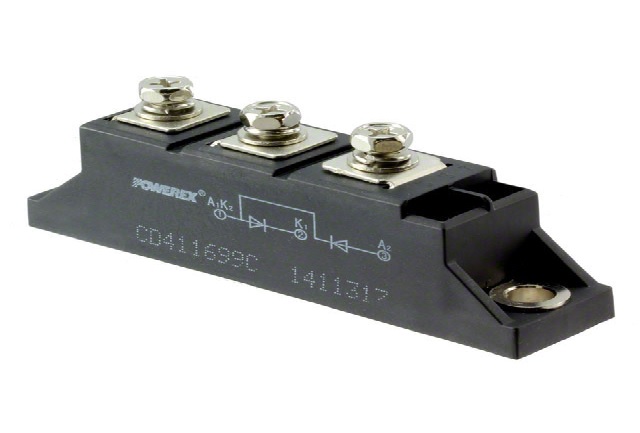A Power diode module is essential in current electrical and electronic systems because it changes the direction of power, fixes problems, and controls things. These modules are essential parts that ensure machines, renewable energy systems, and consumer gadgets all work well and reliably. This guide looks at the basic ideas, uses, benefits, and things to consider regarding power diode modules. It’s great for engineers, tech fans, and anyone who wants to know their role in modern technology.
Table of Contents
Introduction to Power Diode Modules
A power diode module is a semiconductor device with several diodes built into a single box. Their job is to handle high electrical currents and voltages well while also switching and rectifier functions reliably. Each diode in the module controls the flow of electricity in one direction, changing alternating current (AC) to direct current (DC) or the other way around, based on how the circuit is set up. It is possible to use these modules in a wide range of industrial and business settings thanks to their robust construction, thermal management features, and standard packaging.
Working Principle and Structure
The basic idea behind how a power diode module works comes from how semiconductors, usually silicon or silicon carbide, behave. In one way (forward bias), a diode lets current flow freely, but not in the other direction (reverse bias). You can connect more than one diode in a module in parallel or series to get better voltage and current ratings. This setup allows the module to handle high levels of power quickly. Structure-wise, power diode modules have heat sinks, electrical connection points, and insulation materials to control heat loss and keep electricity from flowing through them. This makes them more reliable and last longer.
Applications in Power Electronics
A lot of different power electronics use power diode modules, such as:
Rectification: Rectifying power supplies and industrial tools means changing AC power to DC power.
Inverters: Motor drives, renewable energy systems, and UPS employ inverters to convert DC to AC.
Frequency Converters: HVAC and industrial control systems use frequency converters to control variable speed drives.
Power Factor Correction: Making electrical networks and tools use less energy.
Choppers and Braking Units: These are used to control voltage and stop power in electric cars and heavy machinery.
Power diode modules are essential for systems that need strong power management and control because they can handle high currents and voltages well.
Advantages of Power Diode Modules
One of their main benefits is that the power diode module works reliably under high-power situations. What they offer:
High Current and Voltage Ratings: It can withstand tens of amps and hundreds to thousands of volts.
Low Forward Voltage Drop: Helps keep power loss minimum and energy transfer going smoothly.
Thermal Management: Integrated heat sinks and thermal connectors prevent heat from building up and ensure that the system can run for a long time.
Compact Design: The best packaging and layout maximize power density while taking up the least space in electronic assemblies.
Because of these qualities, power diode modules are perfect for uses that require durability, efficiency, and flexibility.
Considerations for Selection and Deployment
There are a few things you should think about when choosing a power diode module to make sure it works well and is compatible:
Voltage and Current Ratings: Ensure that the module’s specs match the application’s needs so that it doesn’t get too hot or work too slowly.
Heat Dissipation Requirements: Check the thermal control to keep things from getting too hot and to keep their reliability.
Setting up and Mounting: To ensure the module fits perfectly into the system, consider its mechanical measurements, mounting options, and electrical connections.
Conditions in the Environment: Look at the temperature ranges, humidity levels, and environmental toxins that might affect how well the module works.
Giving these things a lot of thought can help you choose the best power diode module for your needs, improving system performance and making it last longer.
Future Trends and Innovations
The field of power diode modules is constantly changing because semiconductor materials, packing methods, and integration technologies are improving. Some future trends of diode module are:
Wide-bandgap Semiconductors: Develop wide-bandgap semiconductors using GaN and SiC.
Enhanced Integration: Adding extra features to module designs, like gate drivers and safety features.
Miniaturization and Higher Power Density: Making small units that can handle more power while still being reliable and efficient.
In the coming years, these new ideas should make power diode modules more useful and expand their possibilities.
Conclusion
Furthermore, power diode modules are essential to current power electronics because they allow for efficient rectification, switching, and control in many situations. This way, people can make intelligent choices when creating and installing reliable and power-efficient electronic systems. Engineers can use the features of the power diode module to make systems work better, use less energy, and adapt to the changing needs of the digital age. These units could change how power is managed and controlled, leading to new ideas and more environmentally friendly ways of designing and implementing electronics.

